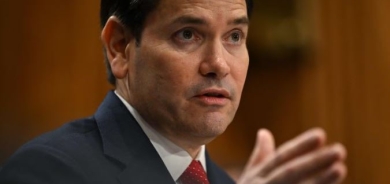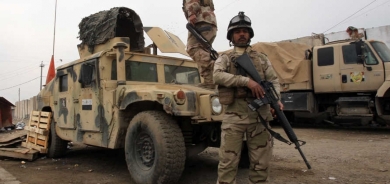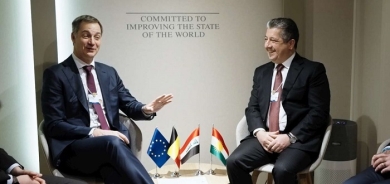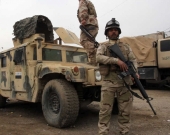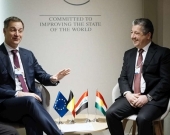Gaza crisis: 13 Israeli soldiers and 87 Gazans killed

It brings the number of Israeli soldiers killed in the offensive to 18.
Gaza suffered the highest death toll since the offensive began, with at least 87 people reported killed on Sunday - 67 of them in one area.
Palestinian President Mahmoud Abbas said the deaths in the Shejaiya district east of Gaza City were a "massacre".
Israeli Prime Minister Benjamin Netanyahu vowed to continue operations in Gaza "as much as we need to" despite the casualties.
He said the Israeli government felt "deep pain" over deaths of its soldiers, and that Hamas, not Israel was responsible for the escalation in Gaza.
Sunday's death toll for the Israel Defense Forces (IDF) is higher than that sustained by the IDF during the entire three-week duration of Operation Cast Lead in 2008-2009, the last time that Israel sent ground troops into Gaza.
The soldiers killed on Sunday were all from the Golani Brigade, the Israel Defense Forces said.
The deaths of so many soldiers on a single day will shock Israeli society, the BBC's Chris Morris reports from southern Israel.
Families 'devastated'
The BBC's Yolande Knell, in Gaza City, says there have been scenes of panic in the Shejaiya area, with thousands of residents fleeing.
The UN says 83,695 people have now been displaced in Gaza and have taken refuge in 61 shelters and that the figure is "rising all the time".
Witnesses spoke of bodies lying in the street.
A humanitarian truce was agreed in the area, but lasted less than an hour with both sides blaming each other for violating the truce.
Paramedics said that rescue workers have so far not been able to get to the eastern part of Shejaiya, an area very close to the Israeli border and about three kilometres (1.2 miles) away from Gaza City, which has seen heavy shelling.
In an interview with BBC Arabic, Israeli Prime Minister Benjamin Netanyahu called Shejaiya a "terror stronghold" and a centre for rockets that are fired out to Israel.
Mr Netanyahu said Israeli troops had no choice but to enter densely populated areas and that they had asked civilians to leave.
The death toll in Gaza rose sharply over the weekend, with the number of Palestinians killed now standing at more than 425 since the operation began, according to Palestinian health officials.
They say the number of wounded from the operation now stands at more than 3,000.
The majority of those killed are civilians, the UN says.
In other developments:
The Israeli military said it "neutralised" two militants who "emerged from a tunnel" in southern Gaza, with no harm to Israeli troops
UN Secretary General Ban Ki-moon is due to arrive in Qatar later to meet Mr Abbas
Hamas is continuing to fire rockets into Israel, with one landing in the city of Ashkelon
At the scene: Yolande Knell in Gaza
The thick, black column of smoke is still rising from Shejaiya, north-east of Gaza City. Earlier in the day there was constant, intense Israeli shelling but a shaky, brief, humanitarian ceasefire produced a period of relative quiet.
This enabled ambulances to enter the area. Medics pulled dead and wounded Palestinians from the rubble of their apartment buildings.
Television pictures have been showing horrific, bloody scenes of dead elderly women and children.
At the Shifa hospital, there is a traffic jam of emergency vehicles by the entrance.
"The hospital was totally overloaded. For many of us, these were the worst scenes we've ever had, not only for the density of patients and total overwhelming of our capacity but because of all this pain and agony," says Norwegian doctor, Mads Gilbert, who has been working in the emergency ward since last night and has been in Gaza during previous conflicts.
"There were children in enormous pain. Totally devastated families were bringing their dead children in and lying on the ground screaming."
line
The Israel Defense Forces (IDF) sent ground troops into Gaza on Thursday after days of heavy air and naval barrages failed to stop rocket fire from Gaza.
Two Israeli civilians have also died since the offensive began on 8 July.
Israel says the operation is necessary to target Hamas tunnel networks, which it says it could not do from the air alone.
Lt Col Peter Lerner, an IDF spokesman, said the offensive was being expanded "to restore security and stability to Israel's residents and citizens".
Meanwhile, the UN warned it was running out of supplies to help more than 50,000 Palestinians who have sought shelter at its schools in Gaza.
Qatar is expected to host a meeting between President Abbas and Ban Ki-moon on Sunday before the UN chief continues on to Kuwait, Egypt, Israel, the Palestinian Territories and Jordan.
Mr Abbas is also due to meet Hamas leader Khaled Meshaal.
Hamas rejected an Egypt-brokered ceasefire last week, saying any deal with Israel must include an end to a blockade of Gaza.
BBC


